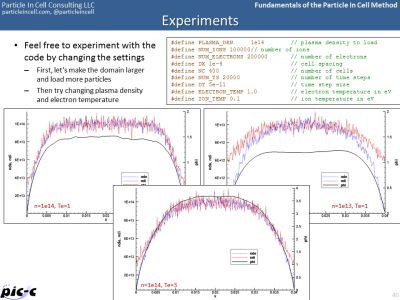Plasma Simulation Courses
August 31st, 2024 Update: The 2024 iteration of PIC Fundamentals has now concluded. This year we had 33 students, out of which two so far have completed all 8 homework assignments and thus received the completion certificate.
In the summer of 2025 I will be teaching a follow up “Advanced Plasma Simulation Methods” course covering electromagnetics, finite element, magnetohydrodynamics, and parallelization. Schedule and registration information will be posted in mid-October. That course will assume that you have already completed PIC Fundamentals (or have comparable skills from elsewhere). If you are new to plasma simulations, and are interested in taking this advance class, please take my PIC Fundamentals class first by registering below, watching the recorded lectures, and completing homework assignments. Moving forward, the plan is to offer PIC Fundamentals and APSM alternate years.
Latest Completed Live Course:
Past Course Listing
In addition, recordings from prior live courses are also available. The material from these courses will be organized into a new Advanced Plasma Simulation Methods class to be offered in the summer 2025.
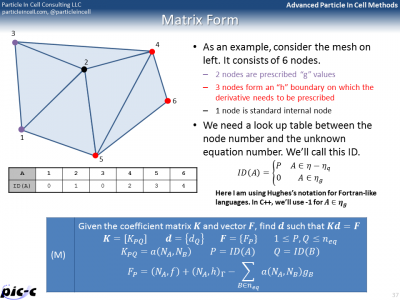
Advanced PIC Techniques covers topics beyond the scope of the intro course. It covers three main concepts: electromagnetic PIC (EM-PIC), Direct Simulation Monte Carlo (DSMC) collision modeling, and finite element PIC (FEM-PIC).
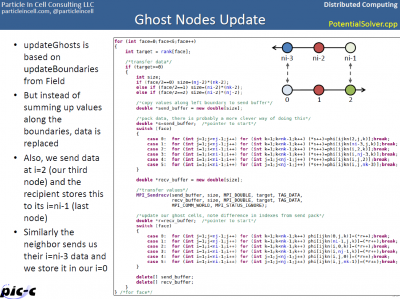
Distributed Computing for Plasma Applications demonstrates how to developed parallel codes that utilize multiple CPUs with multithreading and MPI distributed computing and graphics cards using CUDA to handle large simulation domains or to reduce run time.
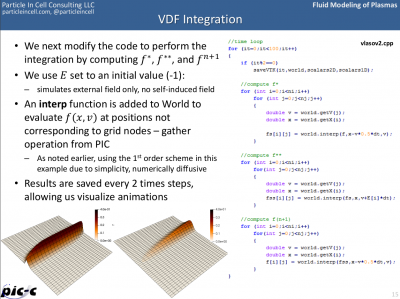
Fluid Modeling
introduces Eulerian approaches for solving plasma flows. We cover single and multi-fluid MHD equation, hybrid approaches with detailed electron model, and advanced topics like Vlasov solvers.
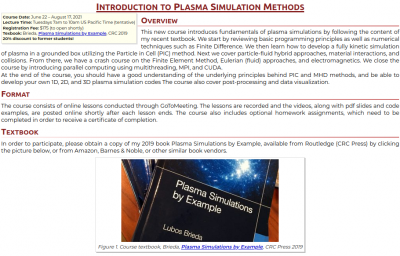
Introduction to Plasma Simulation Methods is a crash course on Particle in Cell (PIC) and Eulerian MHD methods for simulating plasmas. Following my textbook, use use a step-by-step approach to develop 1D, 2D, and 3D structured and unstructured codes, and also learn about electromagnetics, collisions, and code parallelization.
Registration
Testimonials
Thank you for your invaluable help!. I enjoyed a lot taking Fundamentals of PIC course and I have learnt tons of new concepts during these weeks!. I can’t wait to joint the following course on advanced PIC! – Raffaello B., Aug 2024
Very good class that allows a person to start understanding PIC concepts with a basic background in physics. I look forward to the next class. – Cheong C., Aug 2024
I am halfway through the course and I really have to thank you because you have made complex subject accessible, especially for those who do not have a computational background. – DM
This is a great course! – KD
Thank you for all courses, which were, and will be, very helpful for my work. – WK
Some of my students have taken your PIC course couple years ago and in general find the experience useful and rewarding. Having access to these type of courses is especially important for me, as myself I am not a computational person and have to rely on collaborators for help with computations for my students. – Prof. A. S.
